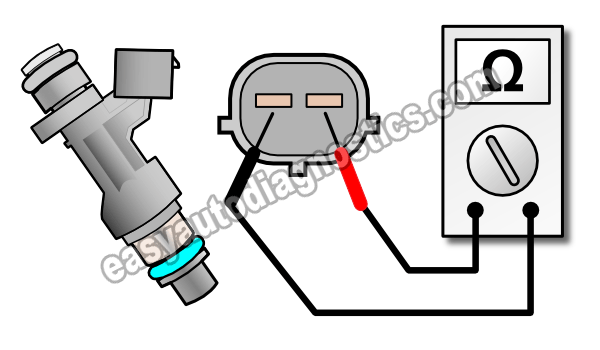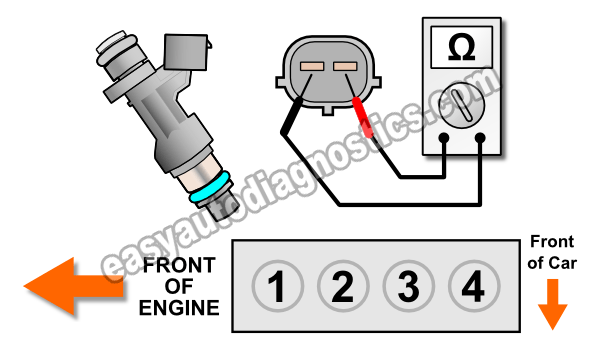
This tutorial will show you how to test the internal resistance of the fuel injectors to see if they are bad or not.
Contents of this tutorial:
Symptoms Of A Bad Fuel Injector
When a fuel injector fails, it usually fails in one of two ways. It'll either stop spraying fuel completely or it'll get clogged (and just not atomize the fuel correctly).
Another type of failure I've seen is a short in the wiring that keeps the fuel injector spraying fuel all of time.
No matter how the fuel injector fails, the symptoms are pretty much the same ones. These symptoms are:
- Rough idle.
- Lack of power.
- Hesitation when you accelerate your 2.5L Nissan Altima (Sentra) down the road.
- Misfire trouble codes:
- P0300: Random Cylinder Misfire.
- P0301: Cylinder #1 Misfire.
- P0302: Cylinder #2 Misfire.
- P0303: Cylinder #3 Misfire.
- P0304: Cylinder #4 Misfire.
The focus of this tutorial is to see if the fuel injector's internal coil has failed (and thus causing the fuel injector to stop injecting fuel), but testing for a clogged injector isn't that much more complicated and I'll show you how in the next page.
Where To Buy The Fuel Injector And Save
Check out the following links and comparison shop the fuel injector on your 2.5L Altima (2.5L Sentra):
Disclosure: As an Amazon Associate, I earn from qualifying purchases. Buying through these links helps support this site at no extra cost to you. Thanks for your support —it really means a lot!
Not sure if the above fuel injectors fit your particular 2.5L Altima (2.5L Sentra)? Don't worry, once you click on the links and arrive on the site, they'll make sure it fits! If it doesn't, they'll find you the right one.
Checking The Injector's Internal Resistance

To find out if a fuel injector's internal winding has fried, we need to check its resistance with a multimeter.
Once we find out its resistance value, we'll compare it to the factory resistance specification.
The test steps below assume that you're testing all four fuel injectors.
- 1
Disconnect the fuel injectors from their harness connectors.
NOTE: To identify which cylinder the fuel injector belongs to, see the above illustration with the cylinder # id for the 2.5L Nissan. - 2
Set your multimeter to Ohms (Ω) mode and:
Measure the resistance of the fuel injector across its two male spade terminals with the multimeter test leads (see the illustration in the image viewer). - 3
Write down the resistance value that your multimeter records for the specific fuel injector you're testing. The illustration above will help you identify the cylinder # the fuel injector belongs to.
- 4
Repeat steps 1 through 3 on the remaining fuel injectors.
NOTE: The 2.5L Nissan resistance specification is: 12.1 to 12.9 Ohms.
Let's find out what your specific multimeter test results mean:
CASE 1: The fuel injector resistance of all 4 was within specification (or similar). This confirms that the fuel injectors are OK. Specifically, that none are shorted or open internally.
Here's why: If any one of the fuel injectors were shorted or open internally, the fuel injector would have registered a radically different resistance value on your multimeter. Since the resistance values for a 4 were uniform, this test result tells you that they are not defective.
CASE 2: One of the fuel injectors registered a completely different resistance value. This indicates that the fuel injector is bad. Replace the fuel injector.





